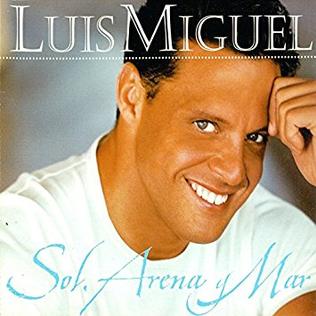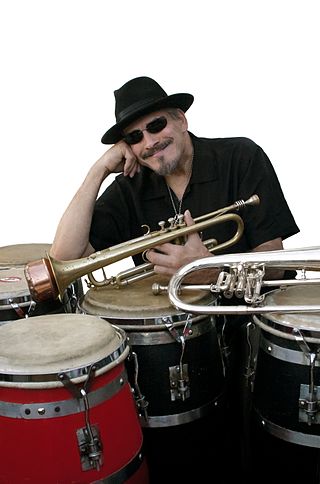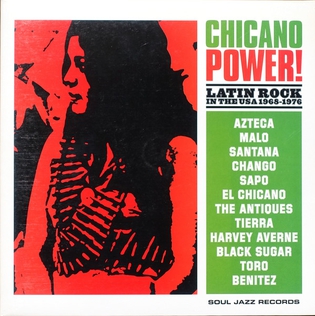Related Research Articles

Chicano rock is rock music performed by Mexican American (Chicano) groups or music with themes derived from Chicano culture. Chicano Rock, to a great extent, does not refer to any single style or approach. Some of these groups do not sing in Spanish at all, or use many specific Latin instruments or sounds. The subgenre is defined by the ethnicity of its performers, and as a result covers a wide range of approaches.
Thee Midniters were an American rock group, among the first Chicano rock bands to have a major hit in the United States. They were one of the best known acts to come out of East Los Angeles in the 1960s, with a cover of "Land of a Thousand Dances" that charted in Canada in 1965, and an instrumental track "Whittier Boulevard" in 1965. Thee Midniters were among the first rock acts to openly sing about Chicano themes in songs such as "Chicano Power" and "The Ballad of César Chávez" in the late 1960s.

Café Tacvba is a band from Ciudad Satélite, Mexico. The group gained popularity in the early 1990s. They were founded in 1989, before they had the current lineup of Rubén Isaac Albarrán Ortega, Emmanuel del Real Díaz, José Alfredo "Joselo" Rangel Arroyo, and Enrique "Quique" Rangel Arroyo:, their friend Roberto Silva played the keyboards for a short period of time. Since the Cuatro Caminos World Tour, Luis "El Children" Ledezma has played the drums in every concert but is not considered an official member of the band, as well as Ramiro Del Real Díaz, who joined the band as a support musician playing the guitar since 2015.
Latin rock is a term to describe a subgenre blending traditional sounds and elements of Latin American and Hispanic Caribbean folk with rock music. However, it is widely used in the English-language media to refer any kind of rock music featuring Spanish or Portuguese vocals. This has led to controversy about the scope of the terminology.

El Gran Silencio is a rock en español band from Monterrey, Mexico that blends a variety of rock, reggae, dancehall, and hip-hop influences with traditional Latin American musical forms such as cumbia, vallenato and Norteño. Their lyrics tend to be bohemian and often talk about life in the “barrio” or poor neighborhoods of Mexican cities, especially Monterrey. As of 2015, they have recorded seven albums, eleven singles, six soundtracks, five tributes and seventeen collaborations and have toured Mexico and the United States.
Tierra is an American Latin R&B band, originally from Los Angeles, California, United States, that was first established in 1972 by former El Chicano members Rudy Salas (guitar) and his brother Steve Salas (vocals). The other original members were Bobby Loya, Bobby Navarrete (reeds), Joey Guerra (keyboards), Steve Falomir, Philip Madayag (drums), and Andre Baeza (percussion). Their biggest hit was the 1980 remake of The Intruders' 1967 hit "Together", written by Gamble & Huff, which reached No. 18 on the Billboard Hot 100, and No. 9 on the US Billboard R&B chart. It was a number one record on Los Angeles radio.
El Chicano was an American brown-eyed soul group from Los Angeles, California, whose style incorporated various modern music genres including rock, funk, soul, blues, jazz, and salsa. The group's name was from Chicano, a term for United States citizens of typically Mexican descent.
Los Illegals is an American Chicano punk band from Los Angeles.

The Plugz were a Latino punk band from Los Angeles that formed in 1977 and disbanded in 1984. They and The Zeros were among the first Latino punk bands, although several garage rock bands, such as Thee Midniters and Question Mark & the Mysterians, predated them. The Plugz melded the spirit of punk and Latino music.
Ruben and the Jets was an American rock and roll band from Los Angeles, California. The band originated as an alias for The Mothers of Invention, Frank Zappa's band, to release Cruising with Ruben & the Jets (1968). Later, musician Rubén Guevara Jr. continued the band with his own lineup. Guevara's "Jets" recorded two albums, For Real! (1973) and Con Safos (1974).

Rock en español is a term used to refer to any kind of rock music featuring Spanish vocals. Compared to English-speaking bands, very few acts reached worldwide success or between Spanish-speaking countries due to a lack of promotion. Despite rock en español's origins in the late 1950s, many rock acts achieved at best nationwide fame until the Internet consolidated the listeners. However, some rock en español artists did become internationally popular with the help of a promotional campaign from the mid-1980s to the mid-1990s called "Rock en tu idioma". Some specific rock-based styles influenced by folkloric rhythms have also developed in these regions. Some of the more prominent styles are Latin rock ; Latin alternative, an alternative rock scene that blended a Latin sound with other genres like Caribbean ska, reggae, and soca; or Andalusian rock, a flamenco-influenced style that emerged in Spain.
Brown-eyed soul, also referred to as Chicano soul, is soul music performed in the United States mainly by Hispanic Latinos and Chicanos in Southern California, East Los Angeles, and San Antonio (Texas) during the 1960s, continuing through to the early 1980s. The trend of Latinos started with Latino rock and roll and rock musicians. "Brown eyed soul" contrasts with blue-eyed soul, soul music performed by non-Hispanic white artists.

The New Sound of the Venezuelan Gozadera is an album by the Venezuelan band Los Amigos Invisibles, released in 1998.

"Sol, Arena y Mar" is a song written by Arturo Perez, Francisco Loyo, and Salo Loyo and co-written, produced, and performed by Mexican singer Luis Miguel. It is a horn-driven uptempo pop song with jazz influence which deals with a strained relationship. The song's lyrics were rumored to have been influenced by Miguel's previous relationship with Daisy Fuentes. It was released as the lead single from the album Amarte Es un Placer on 19 July 1999.

Jerry González was an American bandleader, trumpeter and percussionist of Puerto Rican descent. Geraldo, his father, was a singer in a band and worked for Las Villas, a chain of stores selling Latin American products. Jerry, who liked the trumpet and studied it carefully, but also the congas was a member of Cal Tjader Callen Radcliffe Tjader Jr. an American Jazz musician, known as the most successful non-Latino of Latin Jazz. Together Jerry Gonzalez with his brother, bassist Andy González, played an important role in the development of Latin Jazz during the late 20th century. During the 1970s, both played alongside Eddie Palmieri and in Manny Oquendo's Conjunto Libre, and from 1980 to 2018 they directed The Fort Apache Band. From 2000 to 2018, Jerry González resided in Madrid, where he fronted Los Piratas del Flamenco and El Comando de la Clave. In October 2018, he died of a heart attack after a fire in his home in Madrid.
Rudy Salas was a musician who was a member of the group El Chicano. He was also the co-founder of the L.A. Latin R&B band, Tierra. Along with his brother Steve, he was a major part of the Eastside sound from the mid 1960s.
Edward Louis "Eddie" Davis was an American singer, record producer and record label owner who was active in the 1950s and 1960s. He is an important part of the Los Angeles music scene for that period, especially in the history of Mexican-American rock music.
"Sabor a Mí" is a 1959 bolero by Mexican composer and singer Álvaro Carrillo. Upon its release, it was recorded by many acts such as Los Tres Ases and Rolando Laserie, becoming the most successful song of 1960 in Mexico. It was further popularized by Los Panchos, who collaborated on their rendition with Eydie Gormé in 1964. Among the over 300 songs that he created, this song was considered Carrillo's biggest hit both in Mexico and internationally. Since its creation, the song has been covered by several artists, including among them Mexicans singers Luis Miguel y José José, Cuban jazz pianist Bebo Valdes, k-pop boygroup EXO, and the Mexican American musicians Los Lobos.
The Romancers were an American Chicano rock band from the Eastside Los Angeles who were active in the 1960s. The Romancers were the first East L.A. Chicano band to record an album and were the main influence of the mid-sixties East L.A. sound. The band made two albums on Del-Fi Records and a string of singles for Eddie Davis' Linda label. Max Uballez was the group's leader, chief songwriter, and rhythm guitarist.

Chicano Power! is a 1998 compilation album released by Soul Jazz Records. The album contains Latin bands predominantly from the United States during the late 1960s and 1970s who combined rock, jazz and Latin music. The album was released to positive reception from online music database AllMusic but to more lukewarm or mixed reviews from The Guardian and the NME.
References
- ↑ Los Angeles Times December 24, 1998 Banded Together - Ernesto Lechner
- ↑ The Music's Over Died On This Date (February 27, 2010) Bobby Espinosa / Founding Keyboardist For El Chicano
- ↑ Mark Guerrero website Passages, Bobby Espinosa
- ↑ Los Angeles Times March 01, 2010 Bobby Espinosa dies at 60; keyboardist for 1970s Latin soul band El Chicano
El Chicano's sound blended funk, jazz, rock and R&B. The East L.A. group had top-40 hits in the '70s with 'Viva Tirado' and 'Tell Her She's Lovely. By Claire Noland - ↑ 89.3KPCC March 02 2010 Co-founder of seminal East L.A. band El Chicano dies by Adolfo Guzman-Lopez
- ↑ El Reportero CHICANO ROCKER: Bobby Espinosa y El Chicano. by Antonio Mejías-Rentas
- ↑ San Diego La Prensa March 26, 2010 El Chicano band member joins elite group in Rock and Roll Heaven by Joe Ortiz
- ↑ Brotherhood Band Bobby Espinosa of El Chicano
- ↑ Mr. Duran Productions In memory of El Chicano's Bobby Espinosa (b. 04.29.49 - d. 02.27.10)
- ↑ ¡LatinoLA! March 8, 2010 A Tribute to Bobby Espinosa By Chico Manqueros
- ↑ Oye Como Va!: Hybridity and Identity in Latino Popular Music Deborah Pacini Hernandez Page 38 Chapter 3 West Coast Mexican Americans and Rpck 'n' Roll
- ↑ You found that Eastside Sound Saturday, June 30, 2012 Eastside bands - Mickey & The Invaders/Dyna Might
- ↑ Footsteps in the Dark: The Hidden Histories of Popular Music George Lipsitz Banda 55
- ↑ Mexican American News Dec. 3, 2014 The Roots of Brown Eyed Soul by Gabriel San Roman, OC Weekly Archived November 17, 2015, at the Wayback Machine
- ↑ ¡LatinoLA! March 8, 2010 A Tribute to Bobby Espinosa By Chico Manqueros
- ↑ Encyclopedia of Latino Popular Culture Cordelia Candelaria Page 237 E, El Chicano
- ↑ Latin Music: Musicians, Genres, and Themes Ilan Stevens El Chicano Page 243
- ↑ Jazz Times January/February 1998 Various Artists, Latin Legends Live By Marcela Breton
- ↑ The New Los Angeles Music Awards Jerry Salas
- ↑ Los Angeles Times December 24, 1998 Banded Together - Ernesto Lechner
- ↑ Los Angeles Times September 12, 1996 Rewards Often Outweigh Risks in Producing a CD - Page 1
- ↑ Los Angeles Times September 12, 1996 Rewards Often Outweigh Risks in Producing a CD - (Page 2 of 3)
- ↑ ReverbNation Thee Rhythm Kings / Bio
- ↑ ¡LatinoLA! February 22, 2013 People, Spotlight on the Brown: Singer Rocky Padilla .A.'s King of Chicano R & B by Frankie Firme
- ↑ 89.3KPCC March 02 2010 Co-founder of seminal East L.A. band El Chicano dies by Adolfo Guzman-Lopez
- ↑ San Diego La Prensa March 26, 2010 El Chicano band member joins elite group in Rock and Roll Heaven by Joe Ortiz
- ↑ OC Weekly Tue., Mar. 2 2010 r.i.p. War Bassist Remembers East L.A. Music Legend Bobby Espinosa of El Chicano By Gabriel San Roman Archived 2015-11-17 at the Wayback Machine
- ↑ Imdb El Chicano: In the Eye of the Storm (2009)
- ↑ Casino Del Sol Resort Entertainment, Ram Herrera with special guest El Chicano Archived 2015-11-18 at the Wayback Machine
- ↑ Los Angeles Times December 24, 1998 Banded Together - Ernesto Lechner
- ↑ Discogs Various – Los Angelinos (The Eastside Renaissance)
- ↑ Los Angeles Times September 12, 1996 Rewards Often Outweigh Risks in Producing a CD - Page 1
- ↑ Los Angeles Times September 12, 1996 Rewards Often Outweigh Risks in Producing a CD - (Page 2 of 3)
- ↑ ReverbNation Thee Rhythm Kings / Bio